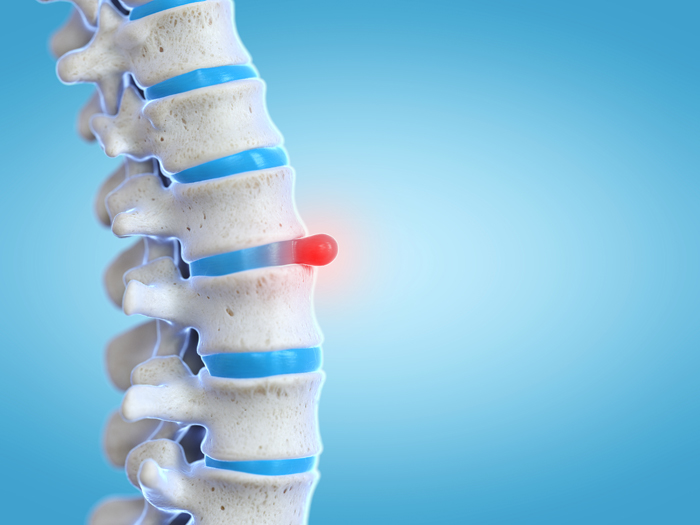Slipped disc (Vertebral Disc Prolapse) Treatment & Diagnostics in Sadashiv Peth, Pune
Slipped disc (Vertebral Disc Prolapse)
A slipped or prolapsed disc leads to severe pain in the lower back. The pain occurs because the disc presses on the nerve root. It can lead to numbness, weakness, or other symptoms in an arm or leg depending on the location of the disc.
What is slipped disc?
Discs are located between each vertebra. These discs have a soft jelly-like center called nucleus pulposus and a stronger outer part. This center part bulges out through the outer part due to weakness. This bulging disc presses against nearby nerves coming from the spinal cord. This might also lead to inflammation developing around the prolapsed part of the disc. This inflammation may irritate the nerves leading to swelling which again puts pressure on the nerve. Though any disc can prolapse, it is common in the lower back. The size of the bulging varies. The larger the prolapse, the severe are the symptoms.

What are the causes of slipped discs?
The gradual wear and tear lead to disc degeneration. Your disc becomes less flexible as you age and is more prone to rupturing or tearing even with light strain or twist. Using your back muscles to lift heavy weight can put significant pressure on your discs. The twisting and turning of your discs while lifting heavy weights leads to herniated discs. The discs lose some of their fluids due to general wear and tear and aging and become spongy and pliable. The discs harden and become tender. The degeneration of discs is usually age-related and starts pretty early in life. It also depends on your lifestyle habits. Repeatedly doing activities that put stress on your spine can lead to herniated discs. Due to stress on the spine, the outer ring of the disc bulges, tears, or cracks. This usually happens in the lower spine and the disc protrusion presses against the nearby nerves causing inflammation. This leads to pain in the lower back and the buttocks.
What are the symptoms of vertebral disc prolapse?
- Weakness: the muscles that are affected by the inflamed nerve. This can cause numbness in the affected area and you might feel difficulty in walking or standing.
- Pain: Pain in the buttocks, thigh, calf, and behind the shoulder blades. You will feel pain in your foot also. This pain elevates when you sneeze, cough, or move to a certain position.
- Numbness or tingling: people with slipped discs often feel tingling and numbness sensations in the affected area.
- Loss of control of bowel and bladder can also occur in severe cases.
Your symptoms help to determine the right diagnosis for you. A physical examination is performed after your doctor understands the complete history of your problem. The location of these symptoms depends on which nerve is affected by the inflamed nerves.
When to see a doctor?
If you feel your neck or back pain traveling down your spine and below your arm or leg, consult your doctor. If you feel a tingling sensation or numbness in your lower body, seek medical attention and get yourself examined.
Request an appointment at Apollo Spectra Hospitals, Swargate, Pune
Call 1860-500-2244 to book an appointment
How to treat slipped discs?
The different treatment options available for the treatment of vertebral disc prolapse are as follows:
- Medications:
- If you have muscle spasms, your doctor will recommend you muscle relaxers.
- Your doctor will prescribe over-the-counter medications if your pain is mild to moderate. Medicines like ibuprofen, acetaminophen, or naproxen sodium are usually prescribed.
- If oral medications are not effective in your case, then your doctor might inject corticosteroids near your affected nerves.
- Therapy: physical therapy might be helpful for you. You will be suggested certain postures and exercises to follow to relieve your pain.
- Surgery: if the above-mentioned treatments fail to improve your conditions after six weeks, your doctor will suggest surgery. In all surgical procedures, the protruding part of the disc is removed. In rare cases, the entire disc might be removed.
Conclusions:
A slipped disc is an age-related phenomenon and there are no definitive ways to completely avoid it. However, by staying physically active and avoiding activities that cause stiffening of your bones and joints, you might prevent or delay his condition.
Your doctor might initially recommend conservative ways like physical therapy, massage, acupuncture, and medications to relieve your pain. In case, there are no significant improvements, you might be recommended surgery.
Surgery is recommended if you have either of the following:
- Loss of bladder or bowel movements
- Difficulty in standing and walking
- Numbness or weakness
- Uncontrolled pain
Our Top Specialities
NOTICE BOARD
CONTACT US
CONTACT US
 Book Appointment
Book Appointment


.svg)
.svg)
.svg)
.svg)








